 “But you will receive power when the Holy Spirit comes upon you, and you will be my witnesses in Jerusalem, throughout Judea, Samaria, and to the ends of the earth.” [Acts 1:8] “Why are you standing looking up at the sky?” [Acts 1:11] The Church, the people of God, has a divinely entrusted mission. We are to be witnesses.
“But you will receive power when the Holy Spirit comes upon you, and you will be my witnesses in Jerusalem, throughout Judea, Samaria, and to the ends of the earth.” [Acts 1:8] “Why are you standing looking up at the sky?” [Acts 1:11] The Church, the people of God, has a divinely entrusted mission. We are to be witnesses.
Since the end of the Monastic era, the primary way to carry the Gospel message “to the ends of the earth” has been the local diocesan church and its parishes. In daily life, prayer and Eucharistic celebration, the disciples centered their lives on the mission’s core values of community, service and teaching. Evangelizing did not need to be endlessly defined to the earliest Christian, because evangelization was the culture of the Church.
During their meetings during the last academic year, the Diocesan Pastoral Council and the Presbyteral Council both explored the best practices of parishes in our diocese and nationally. The focus of these dialogues was to enable our parishes to be evangelizing communities that continually ‘witness’ to the Lord. The Office of the Vicar for Parishes is a resource for their work. The Catholic Sun is spotlighting the ministries of the Chancery. The diocesan offices serve the multiple purposes of assisting the diocesan bishop in his ministry to the local church, assisting those engaged in the ministries related to the specific office, and keeping the conversation alive as we strive to be witnesses.
The work of the Office of the Vicar for Parishes relates to parish programs and practices, pastoral planning, consultative groups, campus ministry, the safe environment program and scouting. Its focus is on the mission of the local church and its parishes as we treasure our history, respond to the current situation, and prepare to embrace the future.
As a support to parishes and pastors, this ministry offers training for parish pastoral councils and parish trustees. In the state of New York, each parish is a Religious Corporation with the bishop as its president. The Vicar for Parishes assists the bishop, his regional vicars and pastors by being attentive to the corporate structure of parishes. The staff is available to work directly with parish councils or parish staff as needed.
Relating to both parish best practices and pastoral planning, the Office of the Vicar coordinates special enrichment and training opportunities. The November “The Art of Change: Faith, Vision and Prophetic Planning” workshops to be offered by Dr. Maureen Gallagher of the Reid Group [www.thereidgroup.biz] are among these opportunities.
Pastoral Planning is at the heart of many recent papal documents. Pope John Paul II’s encyclical Tertio Millennio Adveniente provides ample reflection on the importance of pastoral planning to the mission of the Church. Since 1983 much of our pastoral planning effort has focused on the impact of the major demographic, business and industrial issues impacting most of the Northeast, including our diocese. While these realities impact the resources of every institution in our area, they are critical in providing for the needs of the local church. The truest treasure of the Catholic Church is always God’s people. As the population of our diocese ages and diminishes in number — and a similar trend continues for our priests and religious — the importance of planning becomes more imperative.
One of the most challenging roles for the Vicar for Parishes has been and will continue to be engaging parishes and groups of parishes in inter-parish dialogues and decision-making about the most practical ways to provide resources to continue the mission of the Church particularly in its ministry of service. The role of parish pastoral and parish finance councils in assisting pastors is critical to the health of our parishes. One important element of the parishes found in our faith tradition is that not only is a parish a community for Catholics, but the pastor’s focus is to be attentive to all the people who live within the parish.
The bishop has the support of similar consultative bodies. The Diocesan Finance Council, the Presbyteral Council, the College of Consultors and the Diocesan Pastoral Council [DPC] are each found in the Code of Canon Law. Likewise, his work is supported by the Council of Religious, the deacon community, the diocesan staff and others. Of these the Vicar for Parishes provides support and assistance for the College of Consultors, DPC, and the Presbyteral Council as they assist the bishop in guiding the witness of the local church.
Three other foci of the office that seek to support parish and regional efforts are:
1) The church on campus is an essential presence in the life of the academic community. The office serves as the diocesan director for our presence on 12 campuses and acts as a support to their campus ministers.
2) The office was the original home of the Safe Environment Process and the VIRTUS Program. As this process has grown into an important diocesan resource, its daily work is entrusted to others. Nevertheless, the Vicar for Parishes remains involved with its leadership.
3) The vicar supports the work of the Catholic Committee on Scouting and its work with the Boy Scout and Girl Scout, USA movements.
This is a simple overview of those who join you in the continuing mission of shining the light of the Gospel “to all the ends of the earth.”
(Father Lang is Vicar for Parishes for the Diocese of Syracuse.)



